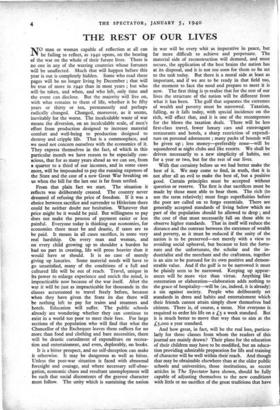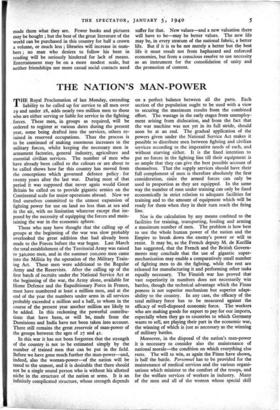THE REST OF OUR LIVES
NO man or woman capable of reflection at all can be failing to reflect, as 194o opens, on the bearing of the war on the whole of their future lives. There is no one in any of the warring countries whose fortunes will be unaffected. Much that will happen before this year is out is completely hidden. Some who read these pages will be no longer living by December ; that Will be true of more in 194o than in most years ; but who will -be taken, and when, and who left, only time and the event can disclose. But the majority will live on, with what remains to them of life, whether it be fifty years or thirty or ten, permanently and perhaps radically changed. Changed, moreover, as it seems, inevitably for the worse. The incalculable waste of war means the diversion, on an incalculable scale, of men's effort from production designed to increase material comfort and well-being to production designed to destroy and cripple life. That is a commonplace, and we need not concern ourselves with the economics of it. They express themselves in the fact, of which in this particular month we have reason to be especially con- scious, that for as many years ahead as we can see, from a quarter to a third of our incomes, and in some cases more, will be impounded to pay. the running expenses of the State and the cost of a new Great War breaking on us when the bill for the last one is far from settled.
From that plain fact we start. The situation it reflects was deliberately created. The country never dreamed of refusing the price of freedom. If it was a choice between sacrifice and surrender to Hitlerism there could be neither doubt nor hesitation. Whatever that price might be it would be paid. But willingness to pay does not make the process of payment easier or less painful. Everyone today is thinking out economies, for economies there must be and drastic, if taxes are to be paid. It means in all cases sacrifice, in some very real hardship. On every man and woman, and on every child growing up to shoulder a burden he had no part in creating, life will press heavier than it would have or should. It is no case of merely giving up luxuries. Some material needs will have to go unsatisfied, many of the conditions of a full and cultured life will be out of reach. Travel, unique in its power to enlarge experience and enrich the mind, is impracticable now because of the war itself. After the war it will be just as impracticable for thousands in the classes accustomed to travel freely before, because when they have given the State its due there will be nothing left to pay for trains and steamers and hotels. Education will suffer. The public schools already are wondering whether they can continue to exist in a world too poor to meet their fees. For large sections of the population who will find that what the Chancellor of the Exchequer leaves them suffices for no more than food and clothing and bare necessities, there will be drastic curtailment of expenditure on recrea- tion and entertainment, and even, deplorably, on books.
It is a bitter prospect, and no self-deception can make it otherwise. It may be dangerous as well as bitter. Unless the post-war situation is faced with abnormal foresight and courage, and where necessary self-abne- gation, economic chaos and resultant unemployment will be such that social discontents of the gravest character must follow. The unity which is sustaining the nation in war will be every whit as imperative in peace, but far more difficult to achieve and perpetuate. The material side of reconstruction will demand, and must secure, the application of the best brains the nation has at its disposal, and it is not too soon for them to be set to the task today. But there is a moral side at least as important, and if we are to be ready in that field too, the moment to face the need and prepare to meet it is now. The first thing is to realise that for the rest of our lives the structure of the nation will be different from what it has been. The gulf that separates the extremes of wealth and poverty must be narrowed. Taxation, falling, as it falls today, with special incidence on the rich, will effect that, and it is one of the recompenses for the blows the taxation deals. There will be less first-class travel, fewer luxury cars and extravagant restaurants and hotels, a sharp restriction of expendi- ture on personal adornment ; many packs of hounds will be given up ; less money—preferably none—will be squandered at night clubs and like resorts. We shall be driven necessarily to a new simplicity of habits, not for a year or two, but for the rest of our lives.
With that certainty before us we had better make the best of it. We may come to find, in truth, that it is not after all an evil to make the best of, but a positive good. Certain principles must be accepted without question or reserve. The first is that sacrifices must be made by those most able to bear them. The rich (to use the term relatively) must forgo superfluities before the poor are called on to forgo essentials. There are generally accepted standards of living below which no part of the population should be allowed to drop ; and the cost of that must necessarily fall on those able to observe higher standards. That in itself will reduce the distance and the contrast between the extremes of wealth and poverty, as it must be reduced if the unity of the nation is to be preserved—not merely with a view to avoiding social upheaval, but because to knit the fortu- nate and the unfortunate, the scholar and the in- dustrialist and the merchant and the craftsman, together is an aim to be pursued for its own positive and demon- strable value. And if the gulf is to be narrowed it must be plainly seen to be narrowed. Keeping up appear- ances will be more vice than virtue. Anything like ostentation or elaboration—elaboration adds nothing to the grace of hospitality—will be (as, indeed, it is already) a sin against society. People who deliberately set standards in dress and habits and entertainment which their friends cannot attain simply show themselves bad citizens. There is, of course, a mean. Not everyone is required to order his life on a L5 a week standard. But it is much better to move that way than to aim at the L5,00o a year standard.
And how great, in fact, will be the real loss, particu- larly for those classes from whom the readers of this journal are mainly drawn? Their plans for the education of their children may have to be modified, but an educa- tion providing admirable preparation for life and training of character will be well within their reach. And though that may be obtainable elsewhere than at the older public schools and universities, those institutions, as recent articles in The Spectator have shown, should be fully capable of adjusting themselves to the new conditions with little or no sacrifice of the great traditions that have
made them what they are. Fewer books and pictures may be bought ; but the best of the great literature of the world can be purchased in this country for half a crown a volume, or much less ; libraries will increase in num- bers ; no man who desires to follow his bent in reading will be seriously hindered for lack of means. Entertainment may be on a more modest scale, but neither friendships nor more casual social contacts need suffer for that. New values—and a new valuation there will have to be—may be better values. The new life may be, in every stratum of the national fabric, a better life. But if it is to be not merely a better but the best life it must result not from haphazard and enforced economies, but from a conscious resolve to use necessity as an instrument for the consolidation of unity and the promotion of content.



































 Previous page
Previous page